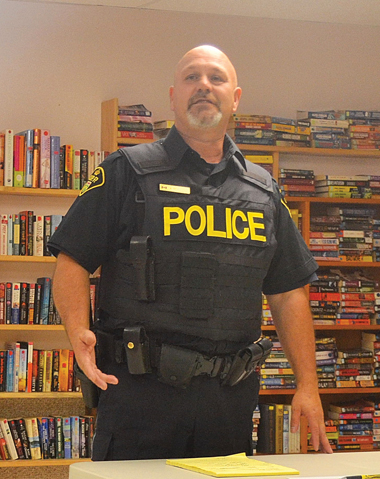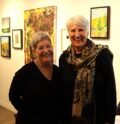Headline News
OPP give tips to thwart a thief
September 24, 2014

By Tony Pearson, Special to This Week
The Ontario Provincial Police believe that homeowners can definitely take steps to make their home less “thief-friendly”.
Some methods have to do with locks, some have to do with landscaping, and a lot has to do with working with your neighbours.
Sergeant Steve Montpetit of the OPP’s Community Safety Services unit stated that if an experienced burglar wants to get into your home, then he will. But he prefers an easy target, and if yours entails a lot of effort and a real threat of capture, he’ll pass it by. So having a look at Alarms for home and windows will be a solid step to take to help deter these thieves from trying to target you.
One element of better home defence is higher quality locks, as standard contractor locks can now easily be opened by a simple tool in a procedure known as “lock bumping”. This information can be applied far and wide to all homeowners who are worried their locks may be easier to break through. If this is the case, then they may want to contact a Locksmith Highett service, for example, to see how they can help and get the home locked tight to deter these criminals.
To foil this, locks with two or three sets of tumblers are needed. Another lock issue involves your can – as the OPP slogan has it, “Lock it or lose it”.
Local officer Jim Dickson noted that many cars are stolen from driveways because not only are the cars unlocked, but the owner has left the keys right in the ignition.
Forming agreements with neighbours is an important part of both deterrence and detection.
Neighbours can keep an eye on your property if you’re away, and you can return the favour for them.
Make sure that your home entrances and windows are visible so your neighbours can check; trees and shrubs can block views and make it easier for burglars to sneak in.
One important measure to take if you are robbed is prompt notification of police. Cst. Dickson observed that lots of property crimes go unreported, because people don’t want to go through a legal process, sometimes because they know the perpetrator, or they figure that their property will never be recovered.
Cottagers may not notice a theft until they return, or may delay reporting until they are back in the area after a period back at their city residence.
Dickson cited two main problems with late or non- reporting: first, it makes it difficult to collect fresh evidence which can link crimes to the same perpetrator and thus increase the likelihood of a conviction.
He stated that constantly improving scientific methods mean that even where conventional evidence, like a fingerprint, is missing, conclusive DNA proof is usually available.
The second problem with late reporting is that even when there is evidence to be found, late reporting makes its collection more time-consuming – and thus ultimately more costly to local taxpayers, who must pick up the extra hours.
He then noted that late reporting also usually meant the home had already been cleaned up, contaminating the crime scene and making recovery of evidence, and conviction of thieves, extremely difficult.
Dickson noted a person reporting a crime does not have to press charges, just as someone reporting to the Crime-Stoppers hotline does not have to testify in court; in fact, their phone number will not even appear, as Crime-Stoppers have permanently disconnected call display.
The other major suggestion the OPP officers offered homeowners was to record and/or mark their goods. People should routinely take down the serial numbers of such things as bikes, ATVs, snowmobiles, boats and motors, televisions and other often pilfered appliances and devices.
Another safety measure is to mark your property with a code or a coded label, such as are now available in many hardware stores on a roll.
Dickson reported that a distinct number is the only certain way of identifying items as yours; otherwise the property could simply end up being returned to the thief or the person he sold it to.
Sgt. Montpetit noted that there is a good guide to home protection on the OPP website, at www.opp.ca, under “resources”.
There were two sessions of this workshop on Saturday.
Both were sparsely attended, with 10 people participating in Bancroft and six in Dungannon.
Township Community Safety Committee chair Wayne Wiggins nonetheless urged those present to pass the information along to their relatives, friends, and neighbours: “If it can help one householder, it’s worth it”, he said.
He promised to try holding the workshops again in the spring, with modifications to increase public interest.
On the ground, Staff Sergeant Mark Wolfe, commander of Bancroft’s OPP detachment, promised that police would soon be going door-to-door in high crime risk areas, offering training in crime prevention.

















